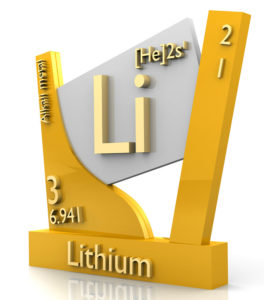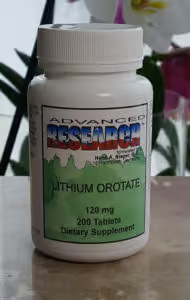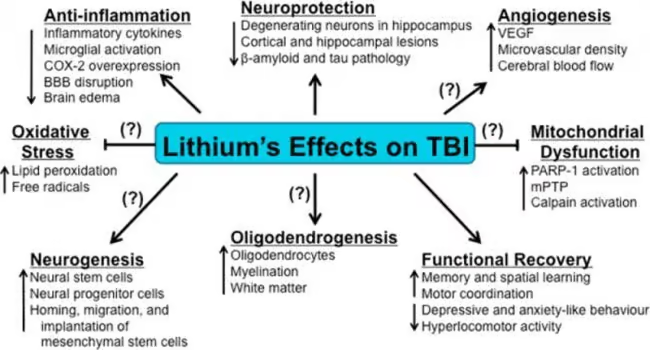Table of Contents
Key Takeaways
- Lithium is a natural alkali metal essential for reproductive health and overall wellness in humans and animals.
- Historically used for therapeutic purposes, lithium is studied for its neuroprotective and mood-stabilizing effects.
- Micro-dosing lithium through supplements like Lithium Orotate offers cognitive benefits such as mood balancing, promoting growth factors and neurogenesis, and brain protection.
- Adequate lithium intake from diet and water may help prevent mental and neurological diseases, while low levels can be associated with depression, anxiety, and memory decline.
- Lithium Orotate is a popular micro-dosing option that provides mood stabilization, neuroprotection, and cognitive enhancement without toxic side effects of higher doses.
Lithium is a soft, silvery-white alkali metal so reactive (it sparks when it touches water) that it’s not found in nature on its own. Instead, it’s found in mineral compounds and in mineral water.
Cosmologists believe that lithium was one of the 3 elements synthesized in the Big Bang.[i] So it’s been around for a long time.
Most of us associate prescription lithium with treating mental illnesses like bipolar disorder and mania (lithium carbonate). Or the lithium-ion battery in our phone. Which has a tendency to blow up occasionally.
Turns out that the anti-psychotic medication lithium isn’t even a drug. It’s actually a naturally occurring mineral. Lithium salts are part of the same family of minerals that include potassium and sodium.
As a nootropic, micro-dosing lithium provides some amazing anti-aging benefits. Recent research shows that low-dose lithium may also help slow the progression of neurodegenerative diseases like Alzheimer’s, dementia and Parkinson’s disease.
Low-dose lithium also helps neurogenesis and memory. And is a mood stabilizer.
Here we’ll investigate daily or frequent use of Lithium Orotate as a nootropic, and how it benefits cognitive health.
Lithium helps:
- Balance mood. Lithium calms mania (extreme highs and lows) by decreasing sensitivity of the post-synaptic norepinephrine receptor.[ii] And increases uptake of norepinephrine into synaptosomes. Preventing the release of this neurotransmitter. And lithium enhances the transport of Vitamin B12 and folate into brain cells.[iii] Affecting mood and aggression.
- Growth Factors. Lithium upregulates brain-derived neurotrophic factor (BDNF), nerve growth factor (NGF), neurotrophin-3 (NT3) and their receptors. And lithium stimulates the proliferation of stem cells in the brain. All boosting neurogenesis and assisting in repair from all types of brain injury.[iv]
- Neuroprotection. Lithium increases brain gray matter, increases DNA replication for neurogenesis, prevents apoptosis, increases N-acetyl-aspartate (NAA), inhibits beta-amyloid secretion and protects against damage once it’s formed, chelates aluminum, and protects against glutamate toxicity.
Overview
Lithium is an alkali mineral and one the trace elements considered essential for both animal and human reproductive health, and general health and wellness.
Discovered as a chemical element in 1817, lithium’s first recorded modern medical use was in 1871 for the treatment of mania.
But the use of lithium for therapeutic use goes back to ancient Greek and Roman times. People enjoyed soaking in alkali springs to help with physical and mental illness.
People have been using mineral springs for therapeutic use ever since. Lithia Springs in Douglas County, Georgia was so popular that people came for miles just to drink the water.
The Sweet Water hotel, a luxury 500-room resort was opened in 1887. And attracted famous authors, business people and prominent politicians who came for the spring’s health benefits. The name “Lithia” stems from water rich in lithium.
Studies from around the world have shown the critical health benefits of lithium. One study using data from 27 Texas counties from 1978 – 1987 found that rates of suicide, homicide and rape were significantly higher in counties whose drinking water contained little or no lithium.[v]
Another study of lithium levels in tap water in 18 municipalities in Japan showed standard mortality ratios lower in places with higher lithium levels.[vi]
Yet another study conducted in Texas in 2013 confirmed the original findings in that state. Drinking water samples from 226 counties found a correlation between lithium levels and suicide rates.[vii]
Researchers who conducted meta-analyses of lithium levels and public drinking water suggested “increasing lithium levels of drinking water could potentially reduce the risk of suicide, and justify administering lithium to tap water.”[viii]
An article in the Lancet in 1949 by John Cade is credited for the modern medical use of lithium as an effective treatment for manic psychosis.[ix]
The United States FDA approved high dose lithium carbonate and lithium citrate in 1970 for the treatment of bipolar disorder. Carbonic acid and citric acid are mineral carriers used to transport lithium throughout your body.
Doctors also prescribe lithium off-label for treating migraines, seizure disorders and psychosis usually after other treatments have failed.
But as we dig deeper into the most recently published research on lithium, we realize this trace element is essential for optimal health and brain function.
The lithium we get from our diet prevents many neurological and psychiatric problems. Micro-dosing lithium as a nootropic with a supplement like Lithium Orotate can help make up for the what we don’t get from our food and water.
Lithium is naturally available from fish, processed meat, milk, dairy products, eggs, potatoes and vegetables. Your typical dietary intake of lithium can range from 2 – 600 mcg. Amounts vary depending on where the food is grown.
How does Lithium work in the brain?
Lithium helps brain health and function in several ways. But two in particular stand out.
- Lithium stabilizes mood. Recent research has discovered that lithium’s mood stabilization effects may be due to its ability to boost the production of new brain cells (neurogenesis).
Lithium inhibits the enzyme glycogen synthase kinase-3β (GSK-3β). This inhibition upregulates brain-derived neurotrophic factor (BDNF), and insulin-like growth factor-1 (IGF-1) which stimulates neural stem cells to produce new neurons in the hippocampus.[x]
When neural stem cells produce new neurons in the hippocampus, mood and memory work as designed. But a breakdown in neurogenesis results in mood disorders.
Lithium has long been known to control mania and stabilize mood in bipolar patients. But it was not generally thought of as an antidepressant. Researchers in Tel Aviv provided the first evidence that inhibiting GSK-3β exerted a rapid antidepressant effect in mice.[xi]
Another team at Howard Hughes Medical Institute in Pennsylvania showed that feeding mice chow laced with low-dose lithium for 15 days produced a dose-dependent antidepressant effect.[xii]
Lithium induced gene transcription in the hippocampus, amygdala and hypothalamus. All areas implicated in depression, anxiety, bipolar disorder, autism and schizophrenia.
- Lithium protects your brain. Your brain cells are at constant risk of damage from exposure to toxins you encounter every day from food, air, water and your environment. And the excitotoxins produced by ordinary brain cell metabolism.
Glutamate plays a major role in the synaptic plasticity needed for learning and memory.[xiii] But over-activity of glutamate on its NMDA receptors causes neuron death and is implicated in Alzheimer’s, Huntington’s and Parkinson’s disease. Lithium inhibits this overactivity.[xiv]
Lithium also increases the production of a neuroprotective protein called bcl-2.[xv] Researchers maintain that lithium is the only “medication” that has been demonstrated to significantly increase bcl-2 in several brain areas.
Lithium has also recently been evaluated in preventing and treating traumatic brain injury. In a study conducted in 2014, Dr. Peter Leeds stated that lithium had “demonstrated robust beneficial effects in experimental models of Traumatic Brain Injury (TBI). These include decreases in TBI-induced brain lesion, suppression of neuroinflammation, protection against blood-brain barrier disruption, normalization of behavioral deficits, and improvement of learning and memory, among others.”[xvi]
How things go bad
In 1985, the United States EPA estimated that dietary intake of lithium from food in the USA varied from 0.6 to 3.1 mg per day.[xvii] For comparison, people who live in the Andes in Northern Argentina consume 2 to 30 mg per day, with 2 – 3 mg just from drinking water.[xviii]
As your dietary sodium and caffeine increases, so does lithium excretion in urine which increases your requirement for this essential trace mineral.
Your exposure to stress and toxins from things like mercury, aspartame, MSG, Bisphenol A (BPA) and other excitotoxins also raise cortisol and other stress hormones. Increasing your need for more water-soluble nutrients like B-vitamins, magnesium, zinc and lithium.
Low lithium levels are associated with …
↑ Depression and anxiety increase
↓ Memory and learning ability decline
↑ Insomnia increases
↑ Sensitivity to stress and chronic pain increase
↓ Natural healing processes decline
Adequate daily intake of lithium could help prevent many mental and neurological diseases due to this trace minerals effects on nervous system metabolism. And it’s anti-inflammatory and antioxidant effects.
Lithium Orotate benefits
The clinical research and studies on the neuroprotective benefits of lithium are so overwhelming, some scientists are beginning to ask “why isn’t everyone using lithium”?
Here’s a summary of how micro-dosing lithium using Lithium Orotate can benefit your brain.
- Inhibits apoptosis – lithium inhibits GSK-3 which has been linked to apoptotic cell death
- NMDA-receptors – lithium reduces glutamate induced toxicity mediated by NMDA-receptors which helps in mood disorders, Alzheimer’s, and other autoimmune and inflammatory diseases
- Neuroprotection – blocks the development of beta-amyloid tangles and plaque
- Neurogenesis – lithium promotes the increase of brain-derived neurotrophic factor (BDNF) needed for synaptic plasticity in learning and memory. Lithium also boosts nerve growth factor and glial-derived neurotrophic factor affecting learning, memory, mood and overall brain health[xix]
- Neuronal stem cells – lithium stimulates the stem cells needed to produce new neurons (neurogenesis)
- Stabilizes mood – lithium is known for providing a calming effect in healthy people as well as those dealing with depression, bipolar disorder, and mania
- Suicide prevention – adequate levels of lithium has been shown to reduce suicide risk in multiple studies worldwide
- Depression – lithium helps with treatment-resistant depression. In fact, lithium has been shown to improve the effectiveness of antidepressant medications
- N-acetyl aspartate (NAA) – lithium increases NAA which has been associated with higher IQ scores[xx] (i.e. lithium will make you smarter!)
The benefits of supplementing with lithium go far beyond just optimizing cognitive health. Lithium also helps decrease insulin resistance, helps in treatment of alcoholism and other addictions, supports bone health, balances your circadian rhythm and more.
How does Lithium Orotate feel?
My personal experience with Lithium Orotate has made me a believer in micro-dosing lithium. I’m Adult ADD and deal with mood swings from time to time.
If I’m going around the bend because something upset me, I take 5 mg of Lithium Orotate. Within 15 minutes my mood stabilizes and I feel normal again. Consistent use puts me in a happy mood.
Many others report you’ll feel the results taking a low dose of lithium quickly. But for some, the full effect can take anywhere from 1 to 3 weeks. Micro-dosing 5 – 10 mg of lithium daily results in consistent results within a month or two for some. I’ve experienced great results within a couple of days.
So if you lash out at people in anger, and don’t fully understand why you get so angry – it could be your lithium levels are low.
Many neurohackers with depression and anger issues notice results quickly. Within the first couple of days you should feel more calm, relaxed, and experience less stress.
Keep in mind that lithium at any dose is not for everyone. But if you get adequate lithium from your diet and water, and still experience some of the mood swings talked about in this review, you could be dealing with other issues. You should know within a couple of hours of supplementing with low-dose lithium if this supplement is for you.
For some, Lithium Orotate means feeling excited about life for the first time in a long time. Anxiety and social anxiety are no longer a problem. Life is more fun and enjoyable.
Some say Lithium Orotate works better than any prescription that they’ve ever tried to treat severe depression. It provides a nice, smooth mood balance without all the toxicity associated with mega-doses of lithium carbonate.
If you’re dealing with PTSD or mild insomnia, you may want to try Lithium Orotate. Focus could improve, racing thoughts diminish and motivation levels could increase. You’ll have more coping ability.
Lithium Orotate Clinical Research
Lithium Improves Memory
A study at McMaster University in Canada set out to determine the effects on hippocampus volume in 14 bipolar patients who received lithium therapy.
The researchers examined the effects of lithium on hippocampal volumes and memory performance and recall over 2 – 4 years. The patients had not received any type of medication prior to using lithium.
The study found increases in hippocampus volume over time. And evidence of improvement of verbal memory performance over the 4-year measurement period.
The researchers concluded that the results of the study were consistent with the literature stating the neuroprotective effects of lithium. And that long-term lithium treatment is associated with preservation of memory and recall due to increased hippocampus size.[xxi]
Lithium Increases Mood in Recovering Addicts
24 adults recovering from heroin or methamphetamine addiction participated in a study in San Diego. Group A received 400 mcg per day of lithium taken orally for 4 weeks. The placebo Group B naturally took a non-active placebo.
Subjects completed a mood test questionnaire containing questions about their ability to think, work, mood and emotions. For the lithium group, mood test scores increased steadily and significantly during the 4 week period.
The lithium group also reported significantly increased levels of happiness, friendliness and energy. Group B showed no improvement during the same period.
The researchers concluded that low-dose lithium provided a mood-improving and stabilizing effect.[xxii]
Lithium Orotate in the Treatment of Alcoholism
In this study, 42 alcoholic patients were treated with Lithium Orotate during alcohol rehabilitation in a private clinical setting for six months. The data was collected from clinical practice records for the 10 years following the initial study.
The patients received 150 mg of Lithium Orotate daily for six months along with calcium orotate, magnesium orotate, bromelain and essential phospholipids.
Ten of the patients had no relapse from 3 – 10 years. 13 patients stayed sober from 1 – 3 years. The remaining patients relapsed between 6 – 12 months.
The researchers concluded that Lithium Orotate therapy was safe in treating addiction with minor adverse side effects.[xxiii]
Lithium Orotate Recommended Dosage
Lithium retains a grim and undeserved reputation. Likely because it was originally associated with serious mental illness. And like most medications, lithium can produce serious side effects if not monitored properly.
Lithium carbonate or lithium chloride salts are typically prescribed for long-term control and to treat bipolar disorder at 900 – 1200 mg per day. The major problem with such high doses of lithium are some very serious and debilitating side effects.
For nootropic use, I suggest Lithium Orotate which typically contains only 5 mg of elemental lithium. Lithium Orotate is orotic acid combined with lithium.
Orotic acid reportedly makes the lithium more bioavailable than lithium carbonate. The lithium is released once it crosses the blood-brain barrier. So you’ll get the benefits of lithium supplementation while avoiding the toxic side effects of high doses.[xxiv]
Lithium Orotate supplements recommended dose is 5 mg two or three times per day. See “Where to buy Lithium Orotate” for more on lithium amounts in nootropic supplements.
Many neurohackers use Lithium Orotate only as needed. For example, when feeling anxious or in the middle of a mood swing.
For someone with bipolar disorder or manic disorders, increasing to two 5 mg tablets up to 3-times per day may be more effective.
Naturopathic doctors suggest stacking 1,000 mg of Omega-3 and 400 UI of Vitamin E (as mixed tocopherols) each day you’re using Lithium Orotate.
Lithium Orotate Side Effects
Do not confuse Lithium Orotate with lithium carbonate. The carbonate version of lithium is only available by prescription and comes with a host of side effects.
Prescription lithium used in excess has been shown to have adverse effects on thyroid and kidney function. This is NOT a problem when supplementing with Lithium Orotate when used at recommended dosages.
Lithium Orotate at low doses is non-toxic and lab tests are not required to monitor your lithium levels because it does not show up in blood samples.
Lithium Orotate should not be used if you are dealing with significant renal or cardiovascular disease, severe dehydration or sodium depletion, or if you’re taking diuretics or ACE inhibitors.
Do not use Lithium Orotate if you are pregnant or breast-feeding.
You should check with your doctor if you are on any medication before using Lithium Orotate.
Where to Buy Lithium Orotate
Mother Nature has already put the antipsychotic “drug” lithium in drinking water. And you get some lithium from food depending on where it’s grown.
Supplemental Lithium Orotate typically comes in 120 or 130 mg capsules or tablets containing 5 mg of elemental lithium.
I recommend and use Advanced Research Lithium Orotate which was formulated by Dr. Hans Nieper.
Nootropics Expert Recommendation
 Lithium Orotate 5 mg 2 or 3 times per day.
Lithium Orotate 5 mg 2 or 3 times per day.
I recommend using Lithium Orotate as a nootropic supplement if you’re feeling anxious or depressed. Or experiencing mood swings.
Your body does not make lithium on its own. So you must get this essential trace mineral from your diet, or a supplement like Lithium Orotate.
Lithium combined with orotic acid makes Lithium Orotate which readily crosses the blood-brain barrier, and you should feel its effects within 15 – 20 minutes of taking it.
Lithium Orotate is especially effective if you’re feeling stressed, or mentally overworked. Your brain uses lithium faster and it needs to be replaced. Which you can do by using Lithium Orotate.
Lithium Orotate is great if you are ADHD because lithium calms the hyperactivity in your brain.
Lithium supplements do not change your state of consciousness. It simply helps bring you back to feeling normal and happy.
I suggest trying Lithium Orotate as a nootropic supplement with your first dose at 5 mg and see how you react. If you experience no negative reaction, try another 5 mg in a few hours. Up to 3 – 5 mg doses per day.
You’ll likely experience the full benefits of Lithium Orotate within a week of consistent use.










Join The Discussion - 879 comments
Kathy
February 8, 2020
Hi David, I am weaning off of paxil 20 mg, after having been on it for 25 years for social anxiety. The medicine has lost its efficacy, so my doctor supplemented with mirtazipine 7.5 mg. I have weaned down to 12 mg of paxil but am still on the mirtazipine, and am reducing my paxil dosage by 1 mg a month, very slowly, but am having withdrawal symptoms of increased anxiety, dizziness, headaches,etc. Is is ok to take lithium orotate while weaning off of the paxil? I am also supplementing with 1200 mg dha fish oils, vit d3+K, methyl B-12, B Supreme, 1,000 mg magnesium gylcinate, pregnenlone, resveratrol, vit C, astragalus, alpha lipoic acid, nrf2, dim eval, probiotic, and collegen hydrostalt. I would like to be only on the natural supplements, so your advice is greatly appreciated. Thank you for the work you do!
David Tomen
February 8, 2020
Kathy, Lithium Orotate works for many people and shouldn’t create a problem with your meds according to the contraindications lists that I’ve looked at. But I’d suggest starting with only one dose first to see how you feel.
Sahil
August 11, 2020
Hi Kathy,
Curious to see if Lithium orotate helped you while having mirtzapine? I am currently on 11.2 mg of mirtz and trying to wean off it .
Thanks.
Dawn Seggelink
January 17, 2020
My son is 13 and I think he struggles with ADHD – we are in the process of completing the evaluation now. Our naturopath suggested he take Lithium Orotate and see if that helps before putting him on any of the prescription medication for ADHD. He is 90 pounds. Would a 5 mg capsule be safe for him? Thank you!
David Tomen
January 18, 2020
Dawn, it should be safe because the amount of elemental lithium is so small at 5 mg. Please take a look at this post on ADHD which provides possible alternatives to stimulant drugs: https://nootropicsexpert.com/best-nootropics-for-adhd-add/
Therese Golley
February 5, 2020
Hi David, I work for a health food retail company and had told our nutritional health coach (NHC) that my husband and I are taking lithium orotate. After one week, I’ve noticed an improvement in my mood and overall sleep patterns. However, our NHC researched lithium while we were talking and she said that there are concerns about lithium and thyroid health.
Apparently, lithium inhibits the uptake of iodine. I found several sites that caution about the use of lithium because of this and also caution against long-term use due to the potential for kidney problems and other thyroid health issues.
As always, there’s a great deal of conflicting information online. Do you know if the “concerns” mentioned on several sites refer to all forms of lithium? I’m unable to find anything that is specific about the form(s) of lithium referred to in their articles. I’m interested in continuing the use of lithium because of the improvement noted.
Any other information and/or references would be very helpful, David. I listen to your YouTube podcasts frequently and always find the information very helpful and interesting. Thank you so much for your hard work and research! I appreciate it!
David Tomen
February 5, 2020
Therese, there is much confusion between “lithium” and “lithium orotate”. Because Lithium Carbonate and the like has been prescribed for decades for psychiatric issues like psychosis and mania. That’s what people are generally talking about. NOT Lithium Orotate.
Lithium Orotate contains max. 5 mg elemental lithium. It’s micro-dosing lithium and doesn’t even show up on blood tests.
I’m severely hypothyroid and use 3 – 4 tables per day without any problem.
Therese Golley
February 5, 2020
Thank you for the quick response, David! I had assumed that this was the case and am grateful for your clarification. I’ll share your response with our staff and friends.
Again, I really appreciate your research and hard work. Thank you so much!
Alyssa
January 15, 2020
Hi David,
I am highly sensitive to medications so I purchased lithium chloride in dropper form in order to be able to slowly up my dosage to 500 mcg (therapist recommended lithium oratate but couldn’t find it in dropper form). Does lithium chloride have the same delivery as lithium oratate? Alternatively, if I should buy lithium oratate capsules, can I break them open into water?
Thank you!
David Tomen
January 16, 2020
Alyssa, Lithium Orotate and lithium chloride are NOT the same thing. You could break open the Lithium Orotate capsule and mix it with a drink. But keep in mind that Lithium Orotate supplies only 5 mg elemental lithium. This is like micro-dosing lithium because it is such a small amount. But it is very effective for many people.
Eric
February 7, 2020
iHerb also has a liquid dropper version of Lithium Orotate available as well from KAL.
randy
January 8, 2020
david, my wife has been taking lithium carbonate 900 mg a day , 1 i(300) n the morning, 2 at night( 600), she’s been diagnosed being bypolar, she’s on lithium only right now, we would like to try the ortate, should I taper off the carbonate?, ortate dosage being bipolar?, God bless, thanks for your help
David Tomen
January 9, 2020
Randy, that’s not something I’m qualified to advise you on because I’m not a doctor.
Your best bet would be to ask other bipolar patients how they did it. If they weaned off of lithium carbonate slowly while adding Lithium Orotate. And if so how exactly they did it.
I realize this will take a little time but I’m sure you’ll find this type of info by searching forums and even Amazon reviews to see what others are saying.
Jason
January 5, 2020
I have good result with Lithium orotate but the problem is, it only last for about 2-3hrs per dosage of 5mg.
David Tomen
January 5, 2020
Jason, you can dose Lithium Orotate up to 4-times per day. So when the effect wears off just take another tablet.
Jason
January 6, 2020
Thanks David 😀
Larry Trowbridge
January 29, 2020
David, you mentioned being able to take lithium orotate up to 4 times a day. Does that mean it can only be taken every 6 hours, or can it be taken more frequently than every 6 hours but only 4 times in a 24 hour period? A related question would be whether or not there is a known helf-life. Also, would taking it too close to bedtime will interfere with falling asleep, or would it be beneficial for sleep? One last question, does it have any effect on libido, positive or negative? I just received 2 bottles today (of the brand you recommended) and since this is something I’ve never used before, I thought asking some questions was in order. Thanks.
David Tomen
January 29, 2020
Larry, not sure what the half life of Lithium Orotate is but it doesn’t matter. Because a lot of research has been done on this and other forms of lithium. And the only ‘safe’ dosage is up to 20 mg per day. Which in this case is 4 tablets: https://www.jpands.org/vol20no4/marshall.pdf.
When you start getting into higher dosages you’re in side effect territory that comes with high-dosage lithium that prescribed by doctors.
It will not interfere with sleep at this dosage. It won’t help you sleep directly but it is calming. And it does not affect libido.
Larry Trowbridge
February 1, 2020
Ok. From the little time I have taken it, I think I can already see that the potential for side effects is real. As I mentioned before, since this is new to me I prefer to err on the side of caution and risk asking “too many” questions than not enough. I just wanted to make sure whether or not 20 mg in 18 hours (my typical day Mon-Thur) was going to be an issue or if I should stick to 15 mg. (15 mg/18 hrs vs 20 mg/18 hrs) Recent production scheduling at work has bumped the stress level up several notches so the benefits of lithium would be much more welcomed as would the benefits of good quality sleep, which was the reason for asking about how/if it affected sleep. Thank you again so much for your willingness to share your knowledge!
PS: Notifications to replies don’t seem to be working.
Larry Trowbridge
March 31, 2020
David, is taking picamillon at the same time as lithium orotate ok, or should it be avoided? Thanks again.
David Tomen
March 31, 2020
Larry, I’m not aware of any contraindication and am sure there isn’t one published anywhere. This falls under the trial and error category of nootropics. And individual responsibility for testing this stuff.
Brandi
December 22, 2019
Lithium Orotate makes my head feel strange. I’m not sure if groggy is the word in looking for but it’s something along those lines. I take 5mg.
What do you think is happening?
David Tomen
December 23, 2019
Brandi, if you’ve read carefully through my review above you’ll know that Lithium Orotate provides several benefits. Including brain repair, heavy metal chelation, increases hippocampus volume, and more.
But this nootropic is not for everyone. If what you are experiencing is a genuine negative side effect it’s possible you should not be using it. If on the other hand there is some repair going on in your brain the “groggy”-ness should settle down in a few days.
Maggie
February 7, 2020
Hi Brandi,
Just wondering how you got on with the Lithium orotate. I’m experiencing weird sensation like brain fuzziness too, and mild to moderate headache. I’m only taking 2.5mg (1/2 capsule). But, I do have a very long history of CFS so I imagine there’s a lot of brain detoxing/repair going on.
Just wondering if symptoms improved for you?
Chasrles
December 12, 2019
Dear, David,
Thank you for this article on article on LO, and this comment section which you take seriously and clearly you have been helping people with. I began taking LO about six months ago. For the first time in my life I am stable and happy and high functioning. Before then I had suffered from bipolar II symptoms for 40 wild years. I was exhausted by the blowback from my extreme behaviors and this year tried one more big search for a cure, and… Something changed!
Now I am in the state of grace and equanimity. My mind is at peace, high functioning. I had tried Lithium Carbonate, lamictal, klonopin, weekly therapy for decades, etc. But still I wrestled with depression, racing thoughts, hyper sexuality, anxiety, self doubt and obsessive thinking, not to mention the awful side effects of prescriptions. All this brain dysfunction lead to excessive journaling, spending sprees, 3 painful divorces, over committing, disorganization, risky behavior, recreational drug use, and living in a state of desperation, for relief from boredom or pain or life itself at times.
Now I don’t want to kill myself and yet I am not numb to my feelings. Amazing! I am pretty certain its the 5mg LO in the morning and night that changed me. I have other things that support the benefits of this tiny wonder 5mg pill of LO. Such as: High quality Omegas, Lots of B, theanine, arginine…so many other supplements. And Im still on 150 welbutrin and 10mg busbar. Doing HIIT exercise, weights, yoga and meditation. And a blend of psycho therapy in CBT, EMDR and ACT.
I can’t thank you enough for this website, which I just discovered today as I searched for confirmation about LO. I will be digging deep into this website as I love my mental health and want to live a long life now, at 61 years old.
Now I want to cut back on those supplements which might be unnecessary since I spend a fortune on them. Reading that you make your own capsules is very encouraging for someone who believes in taking nootropics but does not want to have the burden of a huge new expense just to live normally. I want to spend wisely and I hope to find information on your site about how to do that. I am grateful for people like you who share their research and time. THANK YOU DAVID!
David Tomen
December 12, 2019
Charles, that is good news and happy to know someone else is benefiting from this knowledge.
My wife used to complain about how much I spend on nootropics every month. But she doesn’t anymore. Because she sees what I have come to know. I’m worth the investment.
Keep on doing what you are doing it it’s working. It’s not worth the sacrifice of cutting back just because you feel guilty about how many supplements you use. Never forget the decades you spent getting to this place and what you lost along the way. If this is what it takes …
James
December 5, 2019
David,
I started using Lithium Orotate and the first time I tool 10mg my anxiety, rumination, and sense of dread was gone. I was so clear minded I never thought it was possible to get in that state.
Since then I have been sticking with 5mg in the morning still helpful, but not as good as the first time I was taking 10mg. I started using 500mg of NAC along with it.
Just wondering other combos or upping the dose (not sure if body weight matters I weight 200lb) should I experiment with 10+ mg a day (split out during the day?)
Thank you for such a wonderful site!
David Tomen
December 6, 2019
James, you can safely use 5 mg Lithium Orotate 3-times per day. You may be able to double your dose as well but it depends on what other drugs you are using. Because I found out the hard way that some are contraindicated. Use the drug interaction checker at drugs.com for interactions.
Using NAC is a good idea. But ideally you need to find out what in Lithium is providing you a benefit and find other nootropics that do that too. Tough to advise you which those are because look at the image in this section and you’ll see why: “How does Lithium work in the brain?”